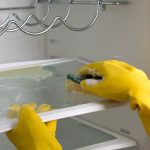When Hannah was sectioned in 2007, her world fell apart. Although she had suffered from depression in the past, she says she had been in denial about how bad things were. “I grew up in a very religious household, and always considered being unwell quite shameful. But, after several serious attempts at self-harming, it came to a head and I had to give up my job as an HIV nurse.” A year later, she was diagnosed with emotionally unstable personality disorder (also known as borderline personality disorder). For the next few years, she says, she was in and out of hospital “like a revolving door”.
By the time she arrived at the Cassel hospital in Richmond, London, it was 2012. “Nothing had worked and it was a last resort after numerous suicide attempts,” she says. “I was referred for psychodynamic therapy, a holistic therapy that encourages patients to develop more awareness of their emotions.” The treatment combined individual and group therapies and activities, where patients support each other’s recovery in a therapeutic community.
Two months into her stay, she met Sean for the first time. “Patients were asked to take other new patients around the facilities when they arrived,” she explains. “I volunteered to show him around, although I was so unwell that I was virtually mute at that point.”
Sean, who has suffered from severe epilepsy since he was a child, was referred to the Cassel after having to leave his job in the civil service. “I was having dissociative episodes as well as seizures, and the doctors realised that my seizures had a psychological root as well as physical,” he says.
When he arrived and met Hannah, he says that building a friendship didn’t occur to him at first, as he was focused on getting well. “I was married, too, and definitely didn’t consider the possibility of a relationship,” he says.
Hannah and Sean started to go on organised trips with other patients, to the theatre and the ballet. “For five years I’d lost the ability to laugh, so my time at Cassel was about coming out of myself again,” says Hannah. “I found it easy to talk to Sean, and he was a really good listener.”
Slowly, they built a friendship, which continued when they moved to outpatient care. “We were both hospitalised for about 10 months,” says Sean, “but we continued to see each other in the outreach groups in the following years of treatment.”
In 2014, after leaving hospital, Sean separated from his wife. It was later that year that he and Hannah grew closer. “I’d struggled to know what I needed from relationships before I had therapy,” says Sean. “But Hannah and I had become such close friends and been through so much together. It was on a group holiday to Weymouth with other patients that we realised we had feelings for each other.”
Hannah says it felt like something had shifted: “We’d had this friendship connection for a while. Then one day he was putting sun cream on me and I felt a spark.” Despite their feelings, they didn’t want to do anything that could jeopardise their recovery. “We spoke to our care team and they were really positive,” says Hannah. “It was just recommended that we take things slow.” She also wanted to take the time to get to know Sean’s seven-year-old daughter, and make sure she was comfortable with their relationship.
Once they had decided to give things a go, they moved into separate outpatient recovery groups and were given couples therapy by the hospital. Hannah lived in Fulham, while Sean remained in Ealing, but they spent several nights a week together. They married in 2021, after all the lockdowns had lifted. “We had our wedding photos taken at the Cassel because it was such an important part of our relationship,” says Hannah. They now live together in Fulham.
Sean, who still experiences regular seizures, took medical retirement in 2012, while Hannah made the decision to go back to nursing in 2020. “I work in a hospice, which is what I always wanted to do,” she says. “It’s been great for my self-esteem, and shows there can be life beyond serious mental illness.”
She loves that life is “never boring” with Sean. “He’s exciting to be with because he always has something to say. We both know what it’s like to go to a dark place and we support each other when we are struggling.”
Sean appreciates Hannah’s wide range of interests and her quirkiness. “She’s her own person and is very in tune with her emotions. She brings out the best in me.”












